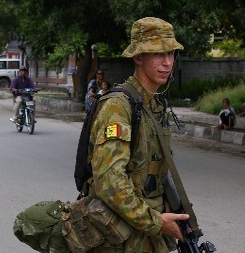DILI, East Timor -- Australian and New Zealand troops and U.N. cops were on the streets in strength on April 9 when East Timorese voters hit the polls in their capital city to pick their next president. By evening, observers were predicting a win for interim Prime Minister Jose Ramos-Horta, a moderate, and expected clashes between rival political gangs had failed to materialize. Though allegations of polling irregularities have surfaced in the days following the election, the lack of violence was a welcome sign of progress in this troubled little country. On April 4, young thugs apparently in the pay of rival political parties roared through this tiny city on motorcycles, hurling rocks, burning rivals' bikes, and slamming heads against brick walls. Police and peacekeepers rushed to suppress the riots, arresting some perpetrators and transporting the injured to hospitals.
Despite Reported Flaws, Largely Peaceful Election Marks Progress in East Timor

